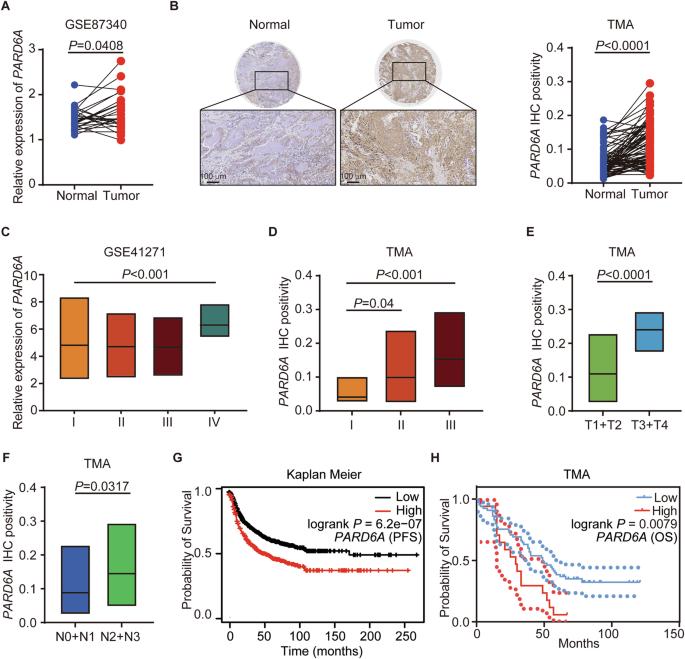PARD6A promotes lung adenocarcinoma cell proliferation and invasion through Serpina3
IF 4.8
3区 医学
Q1 BIOTECHNOLOGY & APPLIED MICROBIOLOGY
引用次数: 0
Abstract
Par6α encoded by PARD6A is a member of the PAR6 family and is reported to promote cancer initiation and progression. PARD6A is frequently upregulated in different types of cancers, but its regulatory role in lung cancer progression is yet to be established. In this study, we analyzed the PARD6A expression in biopsies from lung adenocarcinoma (LUAD) patients, and the survival probability using LUAD tissue microarray (TMA) and online datasets from TCGA and GEO. We conducted in vitro and in vivo assays to assess the role of PARD6A in regulating lung cancer progression, including proliferation, wound healing, transwell, RNA-seq, and subcutaneous tumor mice models. Our findings revealed that PARD6A is highly expressed in cancer tissues from LUAD patients and is associated with poor prognosis in LUAD patients. In vitro assays showed that PARD6A promoted cell proliferation, migration, and invasion. The transcriptome sequencing identified Serpina3 as one of the key downstream molecules of PARD6A. Ectopic expression of Serpina3 rescued impaired proliferation, migration, and invasion in PARD6A-knocking down H1299 cells, whereas silencing Serpina3 impeded enhanced proliferation, migration, and invasion in PARD6A-overexpressing H1975 cells. Our findings suggest that PARD6A promotes lung cancer progression by inducing Serpina3, which may be a promising therapeutic target.

PRAD6A 通过 Serpina3 促进肺腺癌细胞增殖和侵袭
由 PARD6A 编码的 Par6α 是 PAR6 家族的成员,据报道它能促进癌症的发生和发展。PARD6A 在不同类型的癌症中经常上调,但其在肺癌进展中的调控作用尚未确定。在这项研究中,我们利用肺腺癌(LUAD)患者活检组织芯片(TMA)和来自 TCGA 和 GEO 的在线数据集,分析了肺腺癌(LUAD)患者活检组织中 PARD6A 的表达及其生存概率。我们进行了体外和体内试验来评估 PARD6A 在调控肺癌进展中的作用,包括增殖、伤口愈合、transwell、RNA-seq 和皮下肿瘤小鼠模型。我们的研究结果表明,PARD6A 在肺癌患者的癌组织中高表达,并且与肺癌患者的不良预后有关。体外实验表明,PARD6A能促进细胞增殖、迁移和侵袭。转录组测序发现,Serpina3是PARD6A的关键下游分子之一。异位表达Serpina3可挽救PARD6A基因敲除的H1299细胞受损的增殖、迁移和侵袭,而沉默Serpina3可阻碍PARD6A基因高表达的H1975细胞增殖、迁移和侵袭的增强。我们的研究结果表明,PARD6A通过诱导Serpina3促进肺癌进展,而Serpina3可能是一个很有前景的治疗靶点。
本文章由计算机程序翻译,如有差异,请以英文原文为准。
求助全文
约1分钟内获得全文
求助全文
来源期刊

Cancer gene therapy
医学-生物工程与应用微生物
CiteScore
10.20
自引率
0.00%
发文量
150
审稿时长
4-8 weeks
期刊介绍:
Cancer Gene Therapy is the essential gene and cellular therapy resource for cancer researchers and clinicians, keeping readers up to date with the latest developments in gene and cellular therapies for cancer. The journal publishes original laboratory and clinical research papers, case reports and review articles. Publication topics include RNAi approaches, drug resistance, hematopoietic progenitor cell gene transfer, cancer stem cells, cellular therapies, homologous recombination, ribozyme technology, antisense technology, tumor immunotherapy and tumor suppressors, translational research, cancer therapy, gene delivery systems (viral and non-viral), anti-gene therapy (antisense, siRNA & ribozymes), apoptosis; mechanisms and therapies, vaccine development, immunology and immunotherapy, DNA synthesis and repair.
Cancer Gene Therapy publishes the results of laboratory investigations, preclinical studies, and clinical trials in the field of gene transfer/gene therapy and cellular therapies as applied to cancer research. Types of articles published include original research articles; case reports; brief communications; review articles in the main fields of drug resistance/sensitivity, gene therapy, cellular therapy, tumor suppressor and anti-oncogene therapy, cytokine/tumor immunotherapy, etc.; industry perspectives; and letters to the editor.
 求助内容:
求助内容: 应助结果提醒方式:
应助结果提醒方式:


